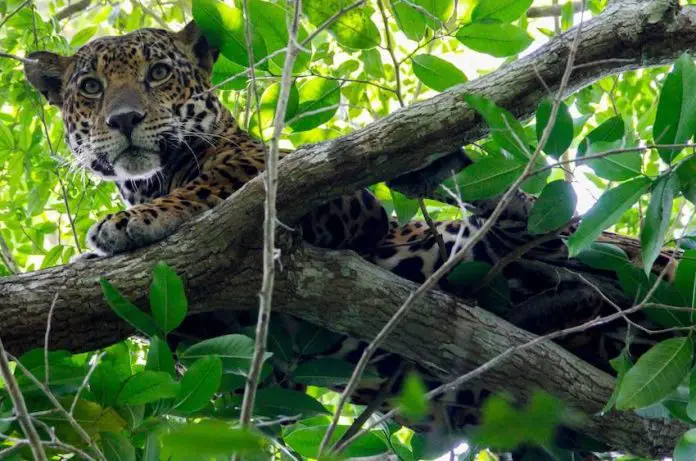The latest jaguar census in Mexico has found that in most study areas, the species’ population has remained stable or even increased since the previous jaguar census, which was completed in 2018.
The head of the National Alliance for Jaguar Conservation, Gerardo Ceballos González, said at a press conference on Tuesday that the final results will be announced in February 2025. “At this stage, the results seem positive,” Ceballos said.
Para el estudio se han colocado 760 cámaras de fototrampeo, las cuales se han mantenido activas durante un periodo de 90 días, con las cuales se han conseguido más de 50 mil fotos de jaguares y sus crías. 🐆
Los felinos se han registrado en 19 de 20 sitios monitoreados. 🌺🌿🌊🌳 pic.twitter.com/vznaeY5FYu
— CONANP (@CONANP_mx) September 24, 2024
The 2024 jaguar census, the third such census to be carried out in Mexico, is ongoing in 19 Mexican states with jaguar corridors, or habitats, including areas of Tabasco, Campeche, Nayarit, Jalisco, Sinaloa, Colima and Guerrero. Monitoring is carried out in collaboration with the National Autonomous University of Mexico (UNAM) and the National Alliance for Jaguar Conservation (ANCJ).
Ceballos noted that Mexico is a pioneer in counting these mighty cats. The first census was carried out in 2008 and took three years to complete. Those first results estimated the population to be 4,000 jaguars, mostly in the Yucatán peninsula. By the publication of the 2018 census, this figure had increased to approximately 4,800.
This year’s census figures are expected to show a slight increase in jaguar numbers. Evidence supporting this trend can be seen in various locations. For instance, the ancient Maya city of Calakmul in Campeche saw its jaguar population grow from three in 2018 to eight in 2024. Similarly, further north in Sinaloa, the jaguar count rose from three or four jaguars to five or six during the same period.
“This project seeks to understand the impact of the conservation actions we have implemented, strengthen public policies to reduce threats [to the species] and promote the conservation of populations of this impressive feline,” the Conanp said in a statement.

Jaguars, the third-largest cat in the world, are native to Mexico. Their habitat extends from Mexico to Argentina, with Brazil being home to around half of the wild jaguars in the world. According to the National Commission of Protected Natural Areas (Conanp), healthy populations of jaguars require an extensive environment to thrive. One specimen needs between 2,500 and 10,000 hectares of land, as well as a network of connected territories.
“The existence of jaguars means there are good conditions for biodiversity,” head of the Conanp Humberto Peña Fuentes said. Their presence signals a healthy ecosystem, ultimately benefiting nearby communities.
Under President Andrés Manuel López Obrador’s administration, the jaguar’s habitat in Mexico has increased by 1.6 million hectares. The Great Calakmul Region, encompassing 1.5 million hectares in Campeche, is the second-largest protected tropical forest on the continent, the Conanp added, and provides vital territory for Mexico’s jaguars.
Currently, the jaguar and its habitat are protected within 65 Natural Protected and Conservation Areas, amounting to over 9 million hectares.
With reports from La Jornada
